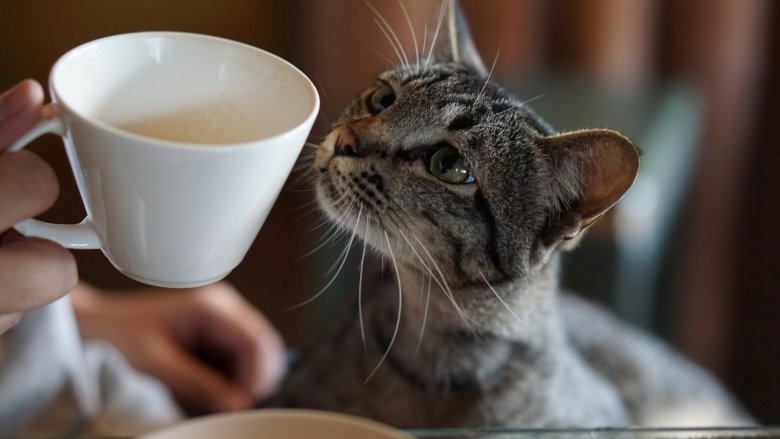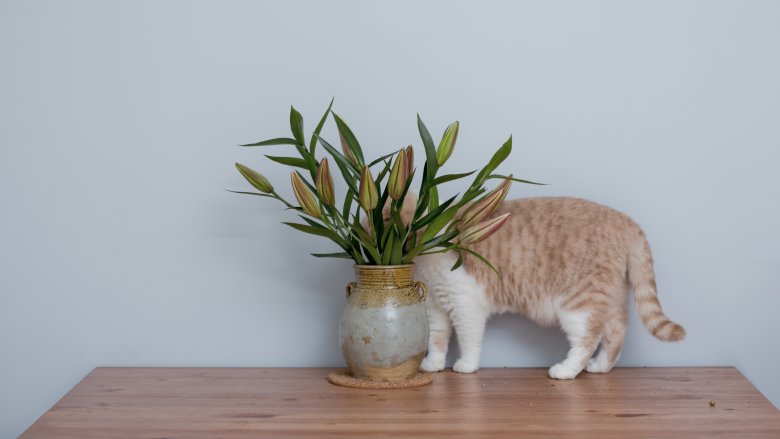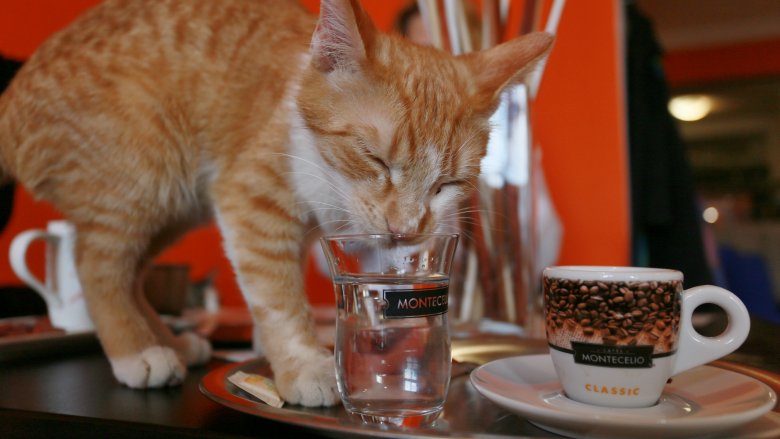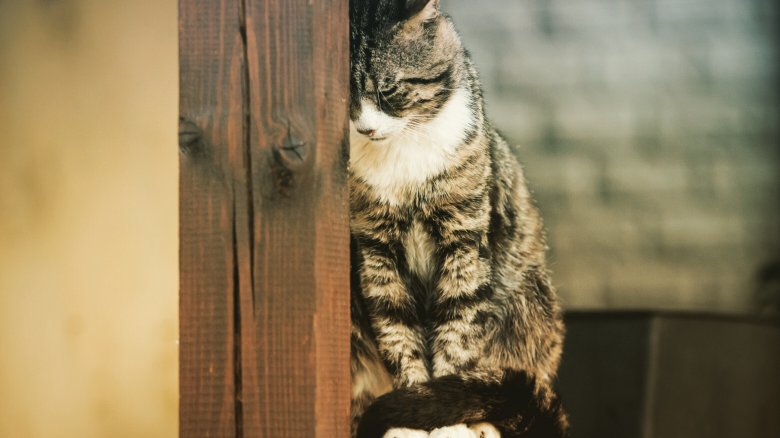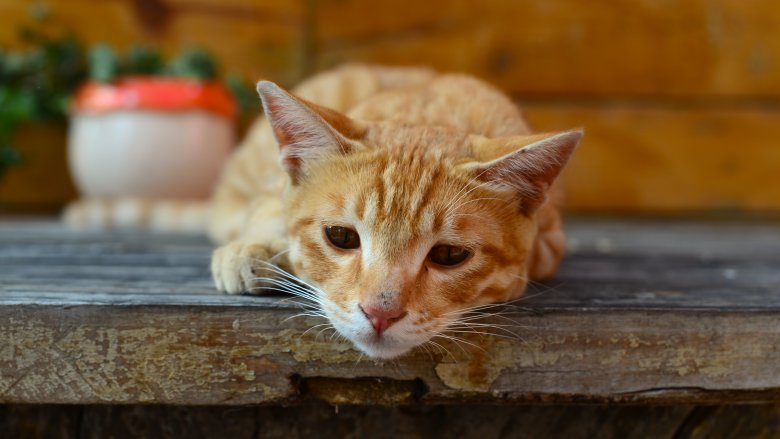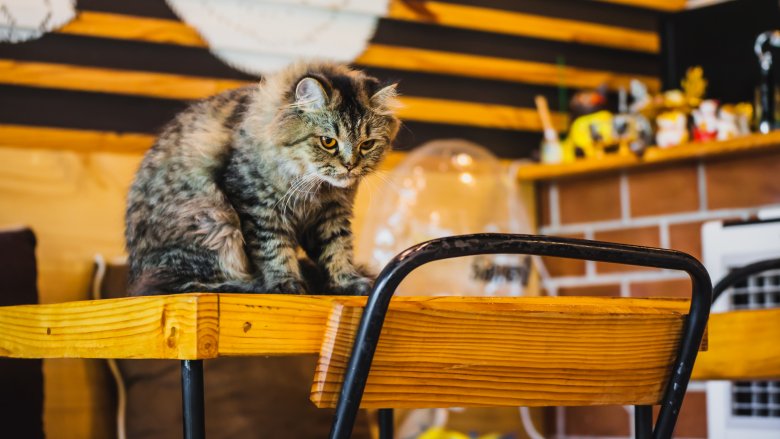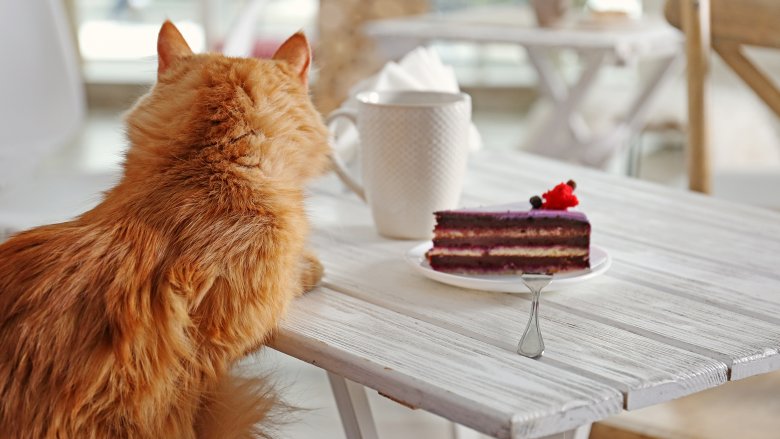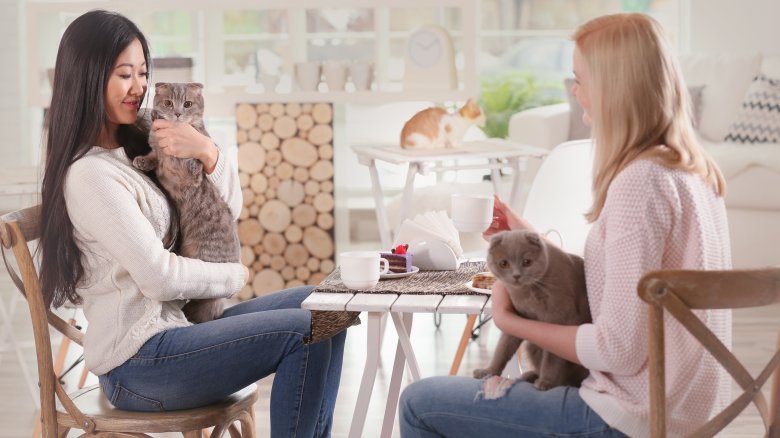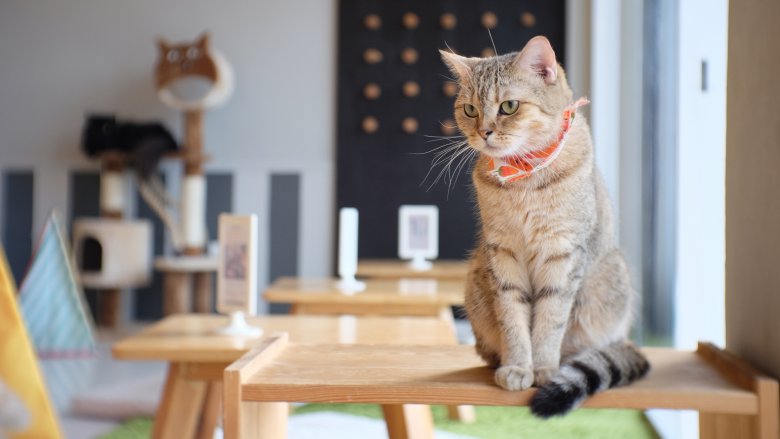The Dirty Truth About Cat Cafes
Anyone who loves cats might love the idea of a little cafe where you can go, drink coffee, and share your table with an adorable new furry friend. In theory, it's a pretty brilliant idea, but in practice, there are some very, very big problems — and they're not what you might think.
According to the Smithsonian, cat cafes got their start in Taiwan. The first one opened in 1998, and hundreds have opened since. They're scattered across a number of countries, with Japan falling particularly hard for the whole concept. They're only in part for the tourists — there are a good number of them that have loyal, local, regulars. Coffee with Cats tracks just how many cat cafes are out there, and as of 2018, there were 255 feline-centric cafes in 37 different countries. That's a ton of coffee and a lot of cats but unfortunately, not all of those cats are happy about the whole situation.
An unstable, terrifying environment
Anyone asked to name a social, loving animal who revels in having attention showered on them 24/7 is probably not going to name cats as one of those animals, and that's at the heart of the problem with cat cafes. Cats Protection is the UK's largest cat charity, and they've been speaking out about how a life confined to a busy, ever-changing environment filled with strangers is nothing short of a feline nightmare.
Cats need their alone time, and sharing close quarters with a dozen others isn't ideal. Cats who do live in small groups still rely on stability and familiarity with the other cats to get along, and cat cafes who act as sort of free-range adoption centers don't give them the opportunity to build up relationships before the dynamic — and the cats — change. They can also be majorly stressed by the constant presence of strangers, and that is, by definition, what a cat cafe is going to have: strangers who want to pet and play with a cat who has no idea who these weird, touchy-feely people are. Bottom line: cats need stability, and cat cafes don't offer it.
When for-profits clash with non-profits
Some cat cafes work hand-in-hand with rescues and shelters in an attempt to get more cats into loving forever homes, but this partnership has a history of problems. Take the TOT Cat Cafe, for example. According to The Star, the Toronto Humane Society took their cats out of the cafe because the cafe had a minimum purchase policy for anyone who wanted to see the cats. Executive director Barbara Steinhoff said making people pay to meet with a potential new family member went against their policy, and there was another hitch, too.
TOT made it clear that before they sent any of their cats home with someone, they wanted another, replacement cat ready and waiting. Delaying an adoption for purely business reasons was unacceptable to the Humane Society, and here's another place the conflict can come in.
On one hand, cat cafes agreeing to act as off-site adoption facilities are in the business of getting cats homed, but they're also in the business of making money. They need to pay employees (who are the ones responsible for caring for the cats) and keep the lights on, and a for-profit business can't always work hand-in-hand with a non-profit.
Welfare closures and abuse issues
You might not have to walk a cat, but they do require daily care — especially when you have the dozen or so cats you'll find in most cat cafes. That's a lot of litter that needs changing, food bowls that need filling, and water bowls that need cleaning. The difference between expected maintenance and actual maintenance means there's been some serious feline welfare abuses reported.
In 2015, Leicester's Cats, Cakes and Coffee was given a hygiene rating of one star (indicating there were major changes that needed to happen). The BBC says the owner claimed it was simply a paperwork issue, but the city council responded to numerous complaints about bad smells and sad-looking cats.
And in 2016, the Neko no Te cat cafe in Tokyo made headlines (via The Independent) when they were shut down after inspectors found their 62 free-roaming cats were living in a 300-square-foot cafe. Unneutered cats were breeding, and most — including elderly cats — were sick. Representatives of the Tokyo Animal Welfare Centre told The Guardian they had tried to intervene, but couldn't stop the neglect.
The potential for disease and illness
There's another problem with keeping that many cats in such a confined area: if one gets sick, they're all getting sick. In 2018, City of San Antonio Animal Care Services intervened and pulled two cats from the San Antonio Cat Cafe. They ordered the remaining 54 cats be quarantined.
The biggest problems were ringworm (which can definitely be passed to humans) and FIP, a normally fatal disease of the intestine. The source of the group's contamination wasn't confirmed by the Miami Herald, but investigators were able to make a guess at what happened — they'd found 36 cats that weren't fully vaccinated before being introduced to the group. The investigation was triggered by a report from a former employee, who claimed four cats had died during her time there — including Decoy, who was left in the public area in the days before he passed.
That cat cafe isn't alone in this, either. Asian news service Coconuts reported on one cat cafe in Bangkok that had some serious health violations going on. No one was surprised — it came out the owner had already gotten in trouble for running another cat cafe where seven cats died from various illnesses.
The cats bred for cafe life
Supporters of cat cafes often point to the potential for adoption as one of their good points, and you could argue anything that gets a cat into a safe and loving forever home is a good thing. The ASCPA says about 3.2 million cats end up in shelters every year, and around 860,000 of them will be euthanized. That's a devastating number, which makes it pretty dark when you consider there are a number of cat cafes out there that rely on breeders for their stock.
When Cat Cafe Manchester opened, the Manchester Evening News publicized their permanent cat roster, filled with beautiful and purebred Maine Coons, Bengals, Norwegian Forest Cats, Ragdolls, Russian Blues, and Chinchilla Persians. Outlets like The Skinny condemned them for it, saying no responsible cat cafe should support breeders, and adding that sourcing cats this way means they're 100 percent about using cats as money-making entertainment.
That particular cat cafe isn't alone, either. New Zealand's Fancy Meow boasts they're the city's first purebred-only cat cafe, but they do arrange "adoptions".
It's the Department of Health's worst nightmare
Cat cafes were slow in coming to the US, and it's no wonder: — they're pretty much the Department of Health's worst nightmare.
The Washington Post took a look at the difficulties potential cat cafes faced in the US, and found there were a ton of rules and regulations that applied to a place both serving food and drink and keeping a dozen or so animals on premises. It took months for cat cafes and the DOH to come to an agreement, and basically, a single cat cafe needs to be made up of two separate areas, one for food and one for the cats. The two can't have a common entrance, and businesses would be overseen by both animal control and the health department. Animal control and the Humane Society decide the number of cats, while the fire department decides the number of people.
When KitTea opened on the West Coast (via CityLab), they needed to consult with the Food Safety Program, the Environmental Health Department, feline vets and behavior specialists... you get the idea. It's insanely complicated.
There's a huge amount of drama
Start digging into cat cafes, and you'll find they're hugely problematic for another reason... there always seems to be a ton of drama cropping up around them. It's no wonder — they're hugely polarizing, with some people saying they're a great way to socialize cats and get them adopted, and others saying they're abusive, traumatic places.
Take Boston's Purr Cat Cafe, for example. They were reported for animal cruelty before they even opened, and that opening date was postponed numerous times. Metro reported neighbors, area residents, and even a one-time employee reported the business had inadequate facilities to keep the cats safe, happy, and healthy.
As if that wasn't bad enough, there was a bizarre social media fallout that followed, and it swept across Facebook and even had followers on Reddit. Local radio station Kiss 108 documented the whole bizarre thing, from allegations of abuse to a strange Facebook post written from the point of view of a cat, and threatening naysayers with legal action. Animal rescue can be a touchy subject, and cat cafes can be an extension of that.
Signs a cat cafe is done right
So, you still want to visit a cat cafe for some coffee and kitty cuddles. What sort of things should you look for to make sure you're taking your business to responsible owners who truly care for the cats under their roof?
The Dodo says they can be a good thing, but stresses the cats should have the tools needed to make sure any interaction happens on their terms: they should always have a place to hide and get away from visitors if they're feeling stressed. There should be rules in place and enforced: no picking up the cats, no chasing, no roughhousing, no waking sleeping cats. There should be plenty of information and educational materials available, too, especially considering many visitors might not have interacted with cats before.
At a glance, Japan Times says a cat cafe with mixed-breed cats and cats that are up for adoption is a sign the cats' welfare comes first. They should all look healthy, have plenty of space, and the place shouldn't have a bad smell. The presence of elderly, healthy cats is also a good sign, as it means they're not discarding older, higher-maintenance cats in favor of kittens. Done right, a cat cafe can be good. Done wrong, it can be horrible.
